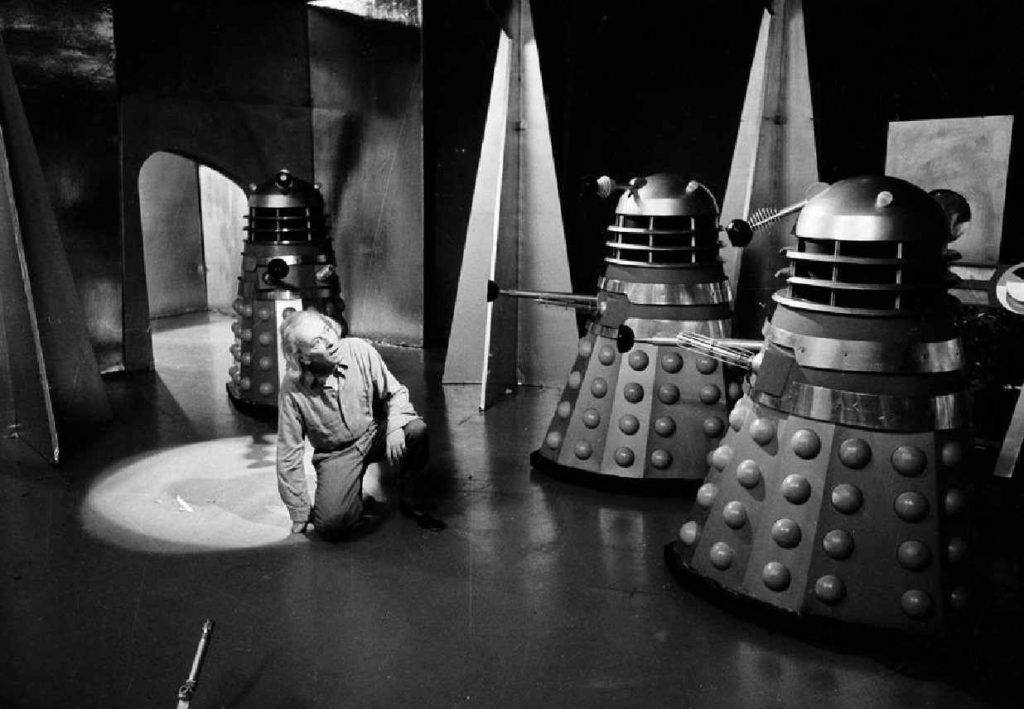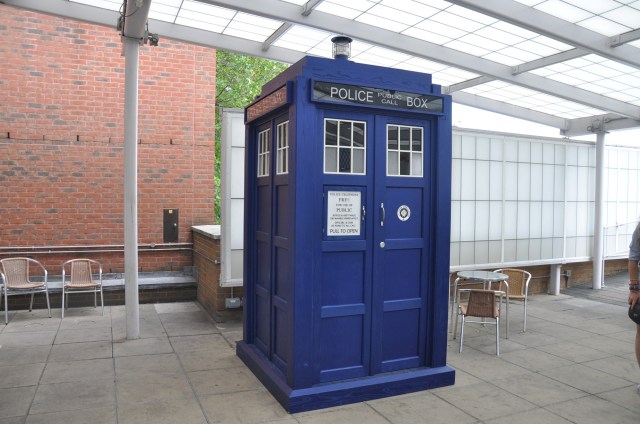The Tardis. Credit: BBC

This is the ninth nomination to UnHerd’s week-long list of some notable “Free Minds’. Being something of a maverick himself, Graeme Archer has decided to redefine the title in his own way.
There’ll be a handful of other nominees in the next 72 hours and so please follow us on Twitter to ensure you are notified of these and other UnHerd postings.
And please use the “HAVE YOUR SAY” button above if you have any views on what you’ve read – or if you’d like to publicly nominate another ‘Free Mind’.
Look at the picture above this text. (Just for a second! Then come back and keep reading.) How does it make you feel?
Some of you will think “meh”; a very small number of British readers will think “police communication in the 1960s”. By far the largest single category of you, however — whichever words come to mind — will feel: happier. The sight of a battered old police box makes life better.
Whenever I pass the one on Buchanan Street in Glasgow I feel a near irresistible urge to push at the door. So Doctor Who — the blue box is, of course, his time-and-space machine, the Tardis — seems a useful device for an investigation into the appeal of the maverick.
I learnt two facts about “maverick” from Google. First of all, its American tang is authentic: the noun comes from Samuel A. Maverick, (1803-70), a Texan ranch owner who refused to brand his calves (so the link with UnHerd is strong.)
Secondly, according to books.google.com, the usage of the term has increased over the last few decades, and that also feels correct. We didn’t really talk about “political mavericks” in the 1980s, except possibly as an obituary-synonym for “failure”.
But the rise of populism, on both Left and Right, is by now well-documented on both sides of the Atlantic. Setting abuse to one side, or one’s well-founded distaste for their individual policies: for which noun would you reach, to describe Trump as well as Sanders, Boris as well as Corbyn? These men — we’ll come back to the gender — are all mavericks. (The other word often used to describe their appeal is “authentic”, and we’ll come back to that too.)
One of my dogmas is that truth lies in fiction. To understand a culture, examine its art — by definition, a novel, or a play, or a television drama, is fiction, and therefore a lie, but it’s also where the inner working of the human mind is laid bare. Because I’m middle-brow, the art I enjoy is lightweight and popular. Back to Doctor Who.

It must mean something, after all, to be one of the longest-running television dramas in the world, now 55 years old. Every generation, British and American children fall in love with the Time Lord, and their fondness for him persists into adulthood, quite unlike infantile fancies for Enid Blyton or talking trains. You don’t last that long without being an archetype.
We know he is a “renegade”, who left his home planet because of his people’s refusal to interfere in the deeds of the universe. Confusingly, he both ignores and lives by this norm. In the programme’s masterpiece, Genesis of the Daleks, the Doctor draws back from exterminating the exterminators: he has the chance to prevent the evolution of the satanic machine-creatures, but refuses to do so. A refusal to alter history’s path, a faith in the future to deal with present ills, even the expulsion of humans from a pre-lapsarian Eden after experiments in re-creation (the Daleks are what happen if you listen to a serpentine “Man is now God” character): remind you of anyone?
His politics are as childish as they are appealing: he is instinctively on the side of the oppressed, and were he British, he’d definitely vote for Corbyn. Armies are always bad, though it’s somehow important to protect the weak. Goodness will deliver that protection, without the necessity for weapons. Anyone who’s felt the appeal of Quakerism knows what’s going on here.
And what are the character’s regenerations than a reflection of Christianity’s appeal? Each time the Doctor rises from the dead he is washed clean of past transgressions. Everyone deserves a second chance, and sometimes we get things wrong. To ask for forgiveness, and to receive it; to acknowledge one’s imperfections, and to be renewed as part of that process — these are precious human inventions (or theological gifts, depending on your disposition). They’re central to Doctor Who.

And “he” is now a “she”. If a Time Lord can become a Time Lady in an instant, what’s all this fuss about gender fluidity? On the substrate of a television programme our hopes and fears play out.
I’d argue that the programme’s longevity is evidence of our persistent longing for that which the character represents. We’re conditioned by our psyche to feel fondly towards blue boxes (bigger on the inside; aren’t we all?) that break us free from the daily grind, and the mavericks who fly them.
However strongly your conscious mind rejects his binary (good/evil; us/them) worldview, the maverick’s refusal to compromise his values — his authenticity, in other words — appeals. We are attracted by the very quality we know to be untrue; we hate compromise, even as we realise its necessity. So by failing to seek popularity, the maverick becomes popular. By refusing to admit complexity, complicated problems are diminished.
Thus the Doctor. But thus, too, Corbyn or Trump. And there’s the danger: it’s one thing to recognise our subconscious desires represented in fiction; quite another to elevate such desires to power.
Corbyn offers a “new kind of politics”: he means socialism. Trump says he’ll “make America great again”. We know perfectly well such phrases are just invented machines — blue boxes of words — that promise a universe rid of difficult decisions. Desirable; impossible. All you’ve got to do, children, is close your eyes, and believe.










Join the discussion
Join like minded readers that support our journalism by becoming a paid subscriber
To join the discussion in the comments, become a paid subscriber.
Join like minded readers that support our journalism, read unlimited articles and enjoy other subscriber-only benefits.
Subscribe